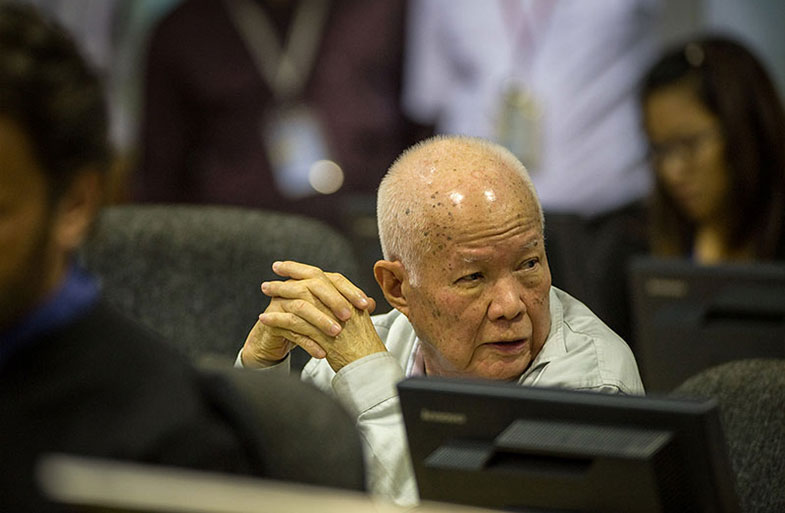The judgment in the first phase of Case 002 at the Khmer Rouge tribunal, in which two senior regime leaders were found guilty of crimes against humanity, was “grossly inadequate” and fell below international standards of justice, court monitors said in a report released on Wednesday.
“A Well-Reasoned Opinion? Critical Analysis of the First Case Against the Alleged Senior Leaders of the Khmer Rouge” was released by the East-West Center, the Asian International Justice Initiative and Stanford University’s WSD Handa Center for Human Rights and International Justice.
The 99-page report presents a damning dissection of the trial procedure and judgment that resulted in Nuon Chea and Khieu Samphan being sentenced to life in prison last year.
Some of the harshest wording in the report is aimed at the judgment, offering a multitude of reasons that the judges at the Extraordinary Chambers in the Courts of Cambodia (ECCC) failed to meet legal standards set by the International Criminal Court and the International Criminal Tribunal for the former Yugoslavia.
“The Judgment in Case 002/01 provides limited insight, raises concerns about fair trial rights, and should be viewed with caution by anyone seeking to rely upon it as a persuasive piece of jurisprudence in another criminal case,” the report says.
“Much of the Judgment reads strikingly like an ill-documented historical narrative, rather than a structured piece of legal writing based upon well-established best practices in preparation of a final written decision in a complex international criminal proceeding,” it continues.
“Unfortunately, even the most generous reader must acknowledge that, as a piece of legal writing, the Case 002/01 Judgment is grossly inadequate.”
Among the issues raised by the authors is the lack of direct attribution of responsibility to Nuon Chea and Khieu Samphan, with the judgment often referring to “abstract entities” such as the “party center” rather than identifying the defendants by name.
Although the judgment states that Khieu Samphan was present in meetings where “critical decisions were made,” it fails to say that he was involved in the decision-making process, the report says. It also notes that the Trial Chamber later acknowledges in the judgment that decision-making was not a collective process under Democratic Kampuchea.
In relation to killings at the Tuol Po Chrey site in Pursat province, the report points out that the names of the regime’s Brother Number Two and former head-of-state are not mentioned once in the three pages of legal findings related to the site.
“In other words, no linkage evidence is adduced in these sections to connect either of the Accused in any way to the murders at Tuol Po Chrey,” it says.
The report also cites a lack of evidence linking Khieu Samphan to the evacuation of Phnom Penh after the Khmer Rouge overthrew the Lon Nol regime, highlighting that the judgment states only that it was “likely” he was in attendance at the meeting where the decision was made.
“Why was it ‘likely?’ Apart from the fact that the exact date of the meeting in June is not even known, the Chamber has no concrete evidence to support this finding, nor is there any explanation as to why a finding of ‘likelihood’ would meet the burden of proof beyond a reasonable doubt on this crucial fact,” the report says.
The Trial Chamber is also accused of prioritizing expediency over the rights of the defendants in its management of documentary evidence, such as the inclusion of more than 1,100 written records of interviews without having witnesses and civil parties testify in court.
“The relentless focus on expediency as a justification for procedural approaches, at the expense of safeguarding the other rights of the Accused (in particular meaningful confrontation of the evidence) certainly suggests a results-driven process rather than a sincere and objective inquiry into the facts,” the report says.
William Smith, international deputy co-prosecutor at the Khmer Rouge tribunal, refuted claims the first phase of Case 002 was rushed.
“Of course, the prosecution is of the view that the trial was fundamentally fair and fairness was not sacrificed for expeditiousness,” Mr. Smith said in an email.
“This is not a ‘rush to judgment’…. The Chamber fundamentally guaranteed all fair trial rights owed to the Accused both at the ECCC and at the international level,” he added.
However, Victor Koppe, defense counsel for Nuon Chea, welcomed the damning assessment, released more than a year after the judgment was handed down.
“It’s very satisfying to realize I’m not the only one thinking this institution is a complete farce,” he said.




